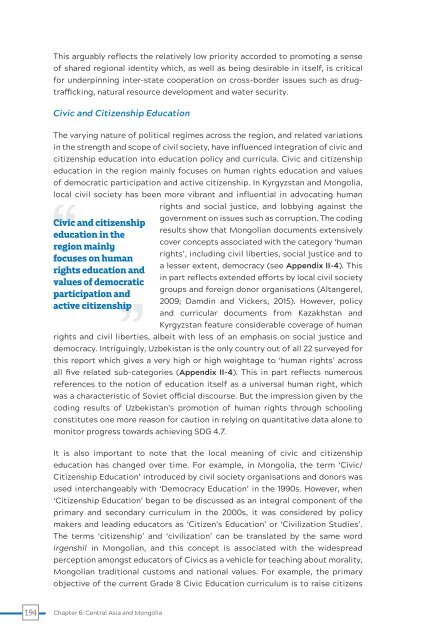Rethinking Schooling for the 21st Century
UNESCO MGIEP officially launched 'Rethinking Schooling for the 21st Century: The State of Education, Peace and Sustainable Development and Global Citizenship' in 2017 at the UNESCO General Conference. This study analyses how far the ideals of SDG 4.7 are embodied in policies and curricula across 22 Asian countries and establishes benchmarks against which future progress can be assessed. It also argues forcefully that we must redefine the purposes of schooling, addressing the fundamental challenges to efforts to promote peace, sustainability and global citizenship through education.
UNESCO MGIEP officially launched 'Rethinking Schooling for the 21st Century: The State of Education, Peace and Sustainable Development and Global Citizenship' in 2017 at the UNESCO General Conference. This study analyses how far the ideals of SDG 4.7 are embodied in policies and curricula across 22 Asian countries and establishes benchmarks against which future progress can be assessed. It also argues forcefully that we must redefine the purposes of schooling, addressing the fundamental challenges to efforts to promote peace, sustainability and global citizenship through education.
You also want an ePaper? Increase the reach of your titles
YUMPU automatically turns print PDFs into web optimized ePapers that Google loves.
This arguably reflects <strong>the</strong> relatively low priority accorded to promoting a sense<br />
of shared regional identity which, as well as being desirable in itself, is critical<br />
<strong>for</strong> underpinning inter-state cooperation on cross-border issues such as drugtrafficking,<br />
natural resource development and water security.<br />
Civic and Citizenship Education<br />
The varying nature of political regimes across <strong>the</strong> region, and related variations<br />
in <strong>the</strong> strength and scope of civil society, have influenced integration of civic and<br />
citizenship education into education policy and curricula. Civic and citizenship<br />
education in <strong>the</strong> region mainly focuses on human rights education and values<br />
of democratic participation and active citizenship. In Kyrgyzstan and Mongolia,<br />
local civil society has been more vibrant and influential in advocating human<br />
Civic and citizenship<br />
education in <strong>the</strong><br />
region mainly<br />
focuses on human<br />
rights education and<br />
values of democratic<br />
participation and<br />
active citizenship<br />
rights and social justice, and lobbying against <strong>the</strong><br />
government on issues such as corruption. The coding<br />
results show that Mongolian documents extensively<br />
cover concepts associated with <strong>the</strong> category ‘human<br />
rights’, including civil liberties, social justice and to<br />
a lesser extent, democracy (see Appendix II-4). This<br />
in part reflects extended ef<strong>for</strong>ts by local civil society<br />
groups and <strong>for</strong>eign donor organisations (Altangerel,<br />
2009; Damdin and Vickers, 2015). However, policy<br />
and curricular documents from Kazakhstan and<br />
Kyrgyzstan feature considerable coverage of human<br />
rights and civil liberties, albeit with less of an emphasis on social justice and<br />
democracy. Intriguingly, Uzbekistan is <strong>the</strong> only country out of all 22 surveyed <strong>for</strong><br />
this report which gives a very high or high weightage to ‘human rights’ across<br />
all five related sub-categories (Appendix II-4). This in part reflects numerous<br />
references to <strong>the</strong> notion of education itself as a universal human right, which<br />
was a characteristic of Soviet official discourse. But <strong>the</strong> impression given by <strong>the</strong><br />
coding results of Uzbekistan’s promotion of human rights through schooling<br />
constitutes one more reason <strong>for</strong> caution in relying on quantitative data alone to<br />
monitor progress towards achieving SDG 4.7.<br />
It is also important to note that <strong>the</strong> local meaning of civic and citizenship<br />
education has changed over time. For example, in Mongolia, <strong>the</strong> term ‘Civic/<br />
Citizenship Education’ introduced by civil society organisations and donors was<br />
used interchangeably with ‘Democracy Education’ in <strong>the</strong> 1990s. However, when<br />
‘Citizenship Education’ began to be discussed as an integral component of <strong>the</strong><br />
primary and secondary curriculum in <strong>the</strong> 2000s, it was considered by policy<br />
makers and leading educators as ‘Citizen’s Education’ or ‘Civilization Studies’.<br />
The terms ‘citizenship’ and ‘civilization’ can be translated by <strong>the</strong> same word<br />
irgenshil in Mongolian, and this concept is associated with <strong>the</strong> widespread<br />
perception amongst educators of Civics as a vehicle <strong>for</strong> teaching about morality,<br />
Mongolian traditional customs and national values. For example, <strong>the</strong> primary<br />
objective of <strong>the</strong> current Grade 8 Civic Education curriculum is to raise citizens<br />
194<br />
Chapter 6: Central Asia and Mongolia

















